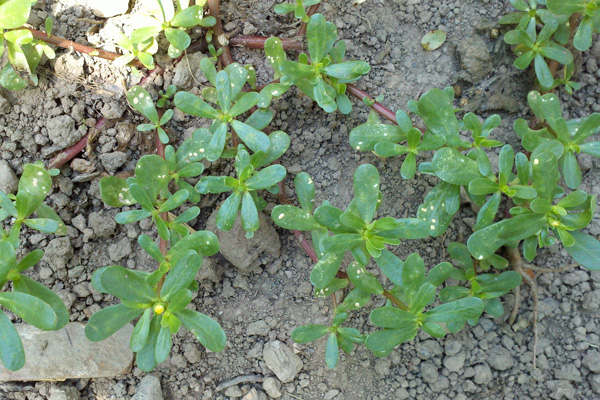Community /
Blogs
The opinions expressed in these blogs are solely those of the people who wrote them, and do not represent the views of WPSU or Penn State University.
Local Food Journey
Five Unusual Edibles from the Garden
Posted by Jamie Oberdick on 07/18 at 07:49 AM

Purslane is a tasty edible weed that is also high in nutrition. Photo Credit Jamie Oberdick.
Right now, people are beginning to harvest all sorts of stuff from the garden. Some of it is conventional stuff, like tomatoes. However, there’s a lot of food in gardens that many people ignore. Some of these may sound outright, well, weird—but give them a shot. They are the “best kept secrets” of the garden.
Bean leaves: When most people think of eating beans, they think of, well, eating the bean part. But yes, you can actually eat bean leaves. Bean leaves are fantastic in salads, and make an offbeat and tasty burger topping. They are packed with protein. One serving of bean leaves has as much protein as one egg.
Nasturtium: A beautiful garden flower, nasturtiums are a favorite in annual beds. While their bright orange and yellow flowers look good in a garden, they also look good in a salad. And they also taste good, adding a peppery zing. The leaves are also edible, but have too intense of a black pepper taste for some.
Kohlrabi leaves: The kohlrabi is grown for it’s “bulb,” which is less a bulb and more a swollen stem since the part most people eat on a kohlrabi is above-ground and not below-ground like most bulbs. However, kohlrabi leaves are pretty tough, so they need to be blanched first, then can be used in your favorite recipe for greens.
Watermelon rind: This may be no surprise to anyone who grew up in Amish country, but you can eat watermelon rinds. Pickled watermelon rind is a staple of Amish cuisine. Unusual, yes, but quite good.
Weeds: Yes, you can eat weeds. Before you say “ewwww,” keep in mind most herbs are basically weeds. Among the edible weeds that are common in your garden is pigweed—also known as wild amaranth, young dandelions, lamb’s quarters, burdock (yes, the thing with the burrs), plantain, and purslane. In fact, a Mexican breakfast dish, huevos con verdolagas, involves purslane. Simply saute 1/2 cup each chopped onion and purslane (young stems and leaves) in oil or butter for several minutes, stir in three beaten eggs, and cook like you would scrambled eggs. Serve with salsa and warm tortillas. It really is quite good.
One thing to keep in mind—there are all sorts of interesting things to eat in the garden, just make sure you check to see if they are edible!
![]() Author: Jamie Oberdick
Author: Jamie Oberdick
Bio: Editor, Local Food Journey | Passionate about supporting local food in Central PA
Leave a Comment
Commenting is not available in this section entry. « Tomato Avalanche Recipes from Nate Bruny of Zola New World Bistro »Most recent entries
 Our Local Food Journey comes to an end
Our Local Food Journey comes to an end- Wednesday, January 31, 2018
- By Jamie Oberdick in Local Food Journey
 Winter isn’t a quiet time at the farm
Winter isn’t a quiet time at the farm- Wednesday, January 31, 2018
- By James Eisenstein in Local Food Journey
 Get the taste of garden season right now by growing herbs indoors
Get the taste of garden season right now by growing herbs indoors- Friday, January 26, 2018
- By Jamie Oberdick in Local Food Journey
 All you need to know about PASA’s Farming for the Future conference
All you need to know about PASA’s Farming for the Future conference- Friday, January 19, 2018
- By Jamie Oberdick in Local Food Journey
Categories
Archives
- January 2018
- December 2017
- November 2017
- October 2017
- September 2017
- August 2017
- July 2017
- June 2017
- May 2017
- April 2017
- March 2017
- February 2017
- January 2017
- December 2016
- November 2016
- October 2016
- September 2016
- August 2016
- July 2016
- June 2016
- May 2016
- April 2016
- March 2016
- February 2016
- January 2016
- December 2015
- November 2015
- October 2015
- September 2015
- August 2015
- July 2015
- June 2015
- May 2015
- April 2015
- March 2015
- February 2015
- January 2015
- December 2014
- November 2014
- October 2014
- September 2014
- August 2014
- July 2014
- June 2014
- May 2014
- April 2014
- March 2014
- February 2014
- January 2014
- December 2013
- November 2013
- October 2013
- September 2013
- August 2013
- July 2013
- June 2013
- May 2013
- April 2013
- March 2013
- February 2013
- January 2013
- December 2012
- November 2012
- October 2012
- September 2012
- August 2012
- July 2012
- June 2012
- May 2012
- April 2012
- March 2012
- February 2012
- January 2012
- December 2011
- November 2011
- October 2011
- September 2011
- August 2011
- July 2011
- June 2011
- May 2011
- April 2011
- March 2011
- February 2011
- January 2011
- December 2010
- November 2010
- October 2010
- September 2010
- August 2010
- July 2010
- June 2010
- May 2010
- April 2010
- March 2010
- February 2010
- January 2010
- December 2009
- November 2009
- October 2009
- September 2009
- August 2009
- July 2009
- June 2009
- May 2009
- April 2009
- March 2009
- February 2009

NO COMMENTS